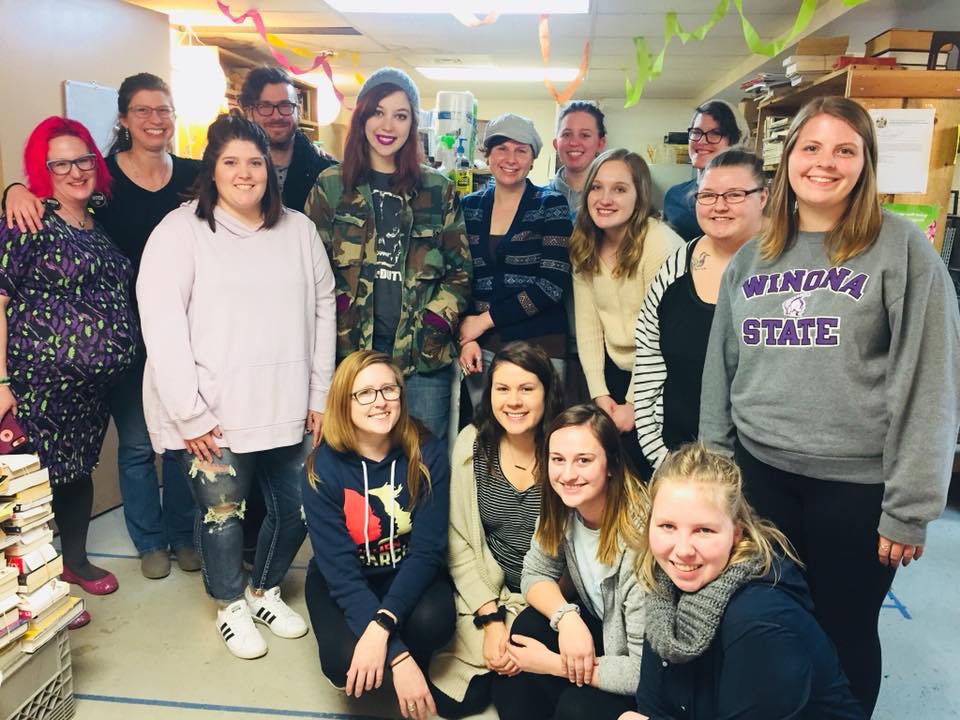
From the Women’s Studies Classroom to LGBT Books to Prisoners Project
On March 26th of 2018, a group of students from Dr. Mary Jo Klinker’s WGSS 374: “Queer Theories and Politics” travelled to Madison, WI to send books to LGBT prisoners and gain first-hand experience of advocacy work, putting their studies of queering Prison abolition to practice. For the purpose of this blog, I’ve introduced some key concepts of our analysis:
What is LGBT Books to Prisoners Project?
LGBT Books to Prisoners is an organization from Madison, WI that sends books and educational materials to LGBT people that are incarcerated. The organization is volunteer and donation based with the mission to “acknowledge, and work against, the oppressive functions of the prison system.”
What is “Queering Prison Abolition”?
The Prison Industrial Complex (PIC) is a social institution that is used to systematically police and enforce violence against people with intersecting and oppressed identities. Identities can include being a racial minority, queer, and gender non-conforming. Policing of these people are much higher than that of other identities. Queering prison abolition movements are not meant to reform the PIC, but aim to abolish these systems of oppression and violence. CeCe McDonald, a transgender woman from Minneapolis, MN was incarcerated in a men’s prison after being charged with murder for a crime of self-defense. In an interview about prison abolition McDonald states, “A true abolitionist, while thinking of reform, would think of ways to: first, free prisoners, second dismantle the prison industrial complex and third, find alternative solutions and other ways to deal with crime and punishment and justice, knowing that we won’t all have the same idea of what that is.”
Why do LGBT prisoners need books?
Research from Coming Out of Concrete Closets reveals, even while incarcerated LGBTQ people, especially of color, are constantly subjected to violence, not only by other prisoners, but also by police and staff. The research is clear and the numbers reveal startling statistics such as, “Black and Latin@/Hispanic respondents were more likely to have their first arrest occur when they were under 18 compared to white respondents (66% versus 51%, respectively).” and “Black, Latin@/Hispanic, mixed-raced, and Native American/American Indian respondents were twice as likely to have been in solitary confinement, at the time of the survey, than white respondents.” These numbers from the survey express the systematic and disproportionate violence that is enacted upon bodies of color and LGBTQ people. Prisoners can benefit greatly from receiving outside materials such as books, newspapers, and letters to keep them connected to the outside and that relate to themselves and their interests.
Localizing Politics:
Paperbacks and Pieces is a local bookstore here in Winona that partnered up with the Queer Theories and Politics class to promote community outreach and social change. The bookstore allowed students to create an LGBTQ books display featuring some of the books that could be and were donated to LGBT Books to Prisoners Project. Paperbacks and Pieces also hosted a donor drive for LGBT Books to Prisoners so that students could take these books with them to donate in Madison.
Reflections: Upon returning, we reflected on some of our experiences:
“I read a letter from a person that was considering transition in their forties, and I was able to pick the text I examined from my midterm, Trans Bodies, Trans Selves, it made it real that sending books makes an impact, because prisoners don’t have access to these resources.”-Abbie Stahl
“I responded to a letter for a parent that wanted a book on HVAC repair to prepare for a job and looking for children’s book, so they would have something to share with their child.”-Jen Sherwood
“I worked to repackage books that were sent back from prisons, it was shocking that they would refuse books. Recently, the project received a letter from a prison mail room that said they weren’t accepting books any longer from the LGBT Books to Prisoner Project. These are resources that prisoners need, and they are making it impossible. I had one person that was in solitary confinement for a year and a half, based on their identity, and they were so grateful to get access to books. What will prisoners do if they can’t get books?” -Abby Lloyd
“My last packaging was for a person who could only have soft cover books, and it limited access to books even further. He was in solitary confinement and wanted a dictionary, to learn….This oppression and experience confirmed so much about what I’ve read about the school-to-prison pipeline.” -Ashlea Dhein
“One of the letters I responded to was just a request to talk to someone, so I was able to send information about the Black and Pink prisoner pen pal program.” -Alexis Olson
“The experience confirmed so much about the treatment of LGBT prisoners, some people said they couldn’t have access to books on LGBT topics so they wouldn’t be harassed, and others wanted books on identity to explore themselves.” -Kelly Brennan
Thank You!
The travel for this student opportunity was graciously funded by a Learning and Community Engagement curriculum grant, the College of Liberal Arts, and the Program of Women’s, Gender, and Sexuality Studies. Many thanks to the LGBT Books to Prisoner Project and Paperbacks and Pieces for partnering with our course!
Great project and much needed!Thank you for your effort and your learning.